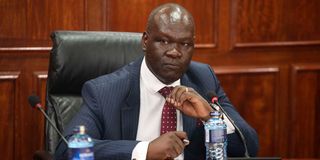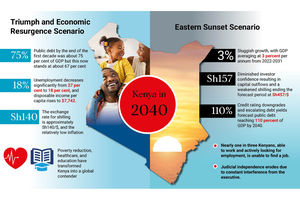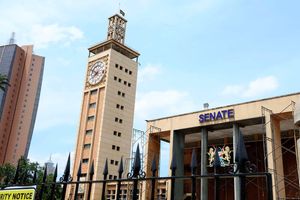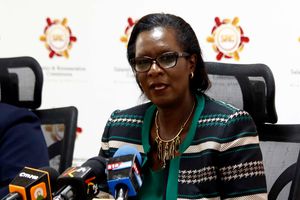
Salaries and Remuneration Commission chairperson Sammy Chepkwony.
It will cost the taxpayer Sh66.6 million a year in monthly salaries for an additional seven principal secretaries following President William Ruto’s reorganisation of his government.
In the changes, State Departments will increase to 57 from 50, to accommodate political interests following the “handshake” between President Ruto and opposition leader, Mr Raila Odinga.
However, that is bad news for the overburdened taxpayer as it increases the country’s already bloated wage bill.
The Salaries and Remuneration Commission (SRC) Gazette Notice of August 9, 2023 caps the monthly pay of a PS at Sh792,519, which includes a basic salary of Sh475,511, Sh150,000 in house allowance and a salary market adjustment of Sh167,008.
“The pay is fixed for the term of service of the PS unless reviewed and set by the SRC,” the SRC gazette notice which retains the structure as contained in the Gazette Notice issued on July 27, 2022, states.
With the changes, it will cost the taxpayer Sh45.2 million a month to cater for the salaries of the 57 PSs as per the remunerative figures gazetted by the SRC, translating to Sh542.1 million a year and Sh2.71 billion in five years.
Currently, it costs the taxpayer Sh39.63 million to cater for the monthly salaries of the 50 PSs, translating to Sh475.5 million in a year and Sh2.4 billion in five years.
The country's wage bill of its one million public service staff on permanent and pensionable terms is spiralling beyond Sh1.1 trillion a year, according to the Ministry of Public Service.
The monthly salaries for the new PSs means an additional Sh5.6 million a month, Sh66.6 million a year and Sh332.9 million in five years.
The SRC has also approved a monthly special responsibility allowance of Sh100,000 to be paid specifically to PSs in charge of the ministries of Interior, the National Treasury and Foreign Affairs “to compensate for the added responsibility over and above the duties for which a regular remuneration is paid”.
PSs just like the President, Deputy President, Cabinet secretaries, judges, chairpersons and members of constitutional commissions and the heads of independent offices, are State officers.

From left: Prof Edward Kisiang'ani, Dr Ouma Oluga and Mr Amos Gathecha.
However, the monthly pay for State officers, specifically in the national Executive, does not include other benefits such as medical, retirement, insurance cover, car loan and mortgage.
The PSs are entitled to an official car of engine capacity not exceeding 3000cc fuelled and maintained by the taxpayer and an annual medical cover fully financed by the public. It covers one spouse and up to four children below the age of 25 years “fully dependent on the State officer”.
The medical cover includes inpatient of Sh10 million, outpatient Sh300,000, maternity Sh150,000, dental Sh75,000 and optical Sh75,000. Retirement packages present two options — pension or gratuity.
Retirement benefits
“A State officer, serving or appointed for a fixed term of office, shall be paid a service gratuity at the rate of 31 per cent of the annual pensionable emolument for the term served,” SRC says.
Where a pension scheme is established for the State Officers appointed for a fixed term of office, SRC shall review and set the rate of contribution by the employer to the scheme “and any other financial retirement benefits.”
A PS is also entitled to State-remunerated staff, a car loan of up to Sh8 million and a mortgage of up to Sh35 million with the two attracting a subsidized interest at the rate of 3 percent per year for the duration of the loan.
The duration of the scheme shall be a maximum of 20 years for the mortgage scheme and five years for the car loan.
The PSs just like other State Officers also enjoy a handsome Daily Subsistence Allowance (DSA) for local and foreign travels with an annual leave allowance of Sh50, 000 and an airtime allowance of up to 20,000 per month.
What is outstanding according to Makueni Senator Dan Maanzo and city lawyer David Ochami is that the newly created State Departments may lead to duplication of roles as they were “unnecessarily” plucked from the existing ones “ably handled by the PSs and therefore not good value for money.”
“The changes are against President Ruto’s own commitment to push austerity measures in a government that has issued a moratorium on employment in public service,” says Mr Maanzo.
Mr Ochami notes that the country’s revenue streams are distressed “not forgetting the ever ballooning public debt.”
“This is not what Kenyans expected. Kenyans wanted a reduction in the number of PSs to less than 30. But what they have done is to increase them to satisfy their own selfish political interests,” said Mr Ochami.
The newly created seven State Departments include Public Investments and Assets Management, National Government Coordination, Justice, Human Rights and Constitutional Affairs, and Science, Research and Innovation.
There is also the State Department for Children Welfare Services, Aviation and Aerospace Development with Special Programmes making a comeback.
National Treasury Cabinet Secretary John Mbadi recently revealed that the country’s public debt stood at Sh11.2 trillion as of December last year.

Treasury Cabinet Secretary John Mbadi.
The recent changes in government, also comes against a backdrop of a wave of looming industrial actions over the government’s failure to honour various Collective Bargaining Agreements (CBAs) that it undertook to implement.
Notably, the education and health sectors are also in crises with non-disbursement capitation funds to public secondary schools, and the Universities and the health sector are reeling in financial crisis brought about by legacy debts owed to health facilities contracted by government to treat its employees.
The remunerative figures would have been higher were it not for the SRC’s swift move to amend the July 27, 2022 gazette notice to ensure that the pay does not rise in the current financial year- 2024/25- due loss of revenue emanating from the rejection of the Finance Bill 2024.
Public compensation bill
“The remuneration and benefits as reviewed and set for the 2023/24 financial year shall continue to apply,” SRC acted in the July 19, 2024 gazette notice.
The SRC decision was based on the National Treasury’s advice specifically on the need to ensure that the total public compensation bill is fiscally sustainable and there being no allocated budget for the implementation of the set remuneration benefits for State Officers.
In the rates gazetted by SRC to apply in the current financial year, a PS would have taken home Sh819,844 in basic pay that would have included Sh491,906 in basic pay, house allowance of Sh150,000 and a salary market adjustment of Sh177,938.
The State Department Public Investments and Assets Management is a new creature at the National Treasury and Economic Planning and adds to the National Treasury and Economic Planning.
The National Government Coordination will be domiciled at the Office of the Prime Cabinet Secretary and Ministry of Foreign Affairs that already has State Departments- Foreign Affairs, Diaspora Affairs and Parliamentary Affairs.
The Justice, Human Rights and Constitutional Affairs State Department will be based at the Office of the Attorney-General with the Science, Research and Innovation hived off from the State Department of Higher Education and Research at the Ministry of Education that also has Basic Education and Vocational and Technical Training State Departments.
There is also the State Department for Children Welfare Services, previously a directorate at the State Department for Social Protection and Senior Citizen Affairs under the Ministry of Labour and Social Protection.
The Aviation and Aerospace Development adds to the Roads and Transport State Departments overseen by the Ministry of Roads and Transport.
The Special Programmes, previously a fully-fledged Ministry under the Kibaki administration and a State Department under the immediate former President Uhuru Kenyatta before being relegated to a directorate under Arid and Semi-Arid Lands (ASALs), makes a comeback as a State Department.
It adds up to the two State Departments- East African Community (EAC) and ASALs and Regional Development under the Ministry of East African Community (EAC), the ASALs and Regional Development.









